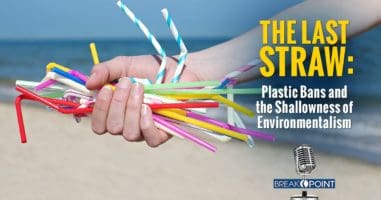Podcast: Play in new window | Download
Subscribe: RSS

The Last Straw – Plastic Bans and the Shallowness of Environmentalism
You’d think incredibly harsh laws designed to protect the planet would—you know—protect the planet. But that’s not typically the case.
 Sometimes, caring for the environment requires making important sacrifices. Far more often, however, the calls to action we’re told will save the planet spawn needlessly inconvenient laws with little if any benefit. That’s the case with this new campaign to ban plastic straws.
Sometimes, caring for the environment requires making important sacrifices. Far more often, however, the calls to action we’re told will save the planet spawn needlessly inconvenient laws with little if any benefit. That’s the case with this new campaign to ban plastic straws.
Last month, Santa Barbara made national news and invited not a little bit of ridicule by passing an ordinance which could send restaurant employees to jail for up to six months for giving out plastic straws.
Seattle has also sipped this environmental Kool-Aid, imposing a $250 fine on straw-distributing outlaws. Not to be outdone, San Francisco’s city council voted unanimously to adopt a similar ban. Other efforts to criminalize plastic straws are underway in New York City, Portland, and Washington, D.C.
Now, even if we think the penalties are ridiculous, a case can be made for serious steps that would stop an environmental crisis. That case cannot be made here, however.
Among the problems with the modern environmental movement is it majoring in the minors. Environmental activists and legislators obsess over trivial life choices that have little real impact on the earth, but which give the appearance of eco-friendliness. Choices like the type of car you drive, the shoes you wear, the coffee you drink most often represent “virtue-signaling,” the tendency to value appearance over action.
And make no mistake, bans on straws with fines that are fit for grand theft are the epitome of appearance over action. As Katherine Timpf at National Review points out, straws represent just 0.02 percent, or 1/5000th of the total plastic waste entering the world’s oceans. When you consider the fact that the U.S. is responsible for only one percent of that total, the idea that a San Francisco Starbucks is going to sell the straw that breaks the planet’s back is laughable.
The environmental movement’s new war on straws is just part of its misguided war on all things plastic. I call it misguided because this war is being waged in all the wrong countries. As a study by the Helmholtz Centre for Environmental Research found last year, ninety percent of the plastic polluting our world’s oceans comes from just ten rivers, and all of those are located in Asia and Africa.
And, as Susan Freinkel wrote several years ago in the New York Times, plastic doesn’t have to be a pollutant. This marvelous substance was originally “hailed for its potential to reduce mankind’s heavy environmental footprint,” replacing commodities like paper, which exact a high toll on nature. (Remember the “paper or plastic” decision at the grocery store).
Our true problem, Freinkel suggests, is not plastic, but a culture with throwaway habits. We love to use products once and then toss them in the trash, on the ground, or into rivers and oceans. Changing public behavior and reducing the amount of plastic we throw away would go a lot further toward saving the environment than aggressive bans on one very tiny, inconsequential piece of plastic.
Christians ought to take environmental problems seriously. And that should mean looking for solutions that are effective. Our top environmental priority should be stewardship, not signaling. God entrusted this world to us—we should keep it beautiful and healthy.
Modern environmentalism, with its commitment to regulate almost every detail of our lives for very little ecological benefit isn’t achieving that goal. Still, the folks in Santa Barbara and elsewhere are just going to have to suck it up and deal with life without straws.
Please come to BreakPoint.org/free and download this month’s free resource: a chapter from pro-life advocate Stephanie Gray’s book, “Love Unleashes Life.” It’s our featured BreakPoint resource for August.
The Last Straw: Plastic Bans and the Shallowness of Environmentalism
Christians are called to be stewards of creation, and that includes the environment. We should be serious about finding real solutions to environmental problems and encouraging others to do so without majoring on the minors, as John points out. For further discussion on this issue, check out the links below.
Resources:
Santa Barbara Authorizes Jail Time for Handing Out Straws
- Katherine Timpf | National Review | July 24, 2018
10 rivers are responsible for 90% of the plastic in the ocean
- Verity Burns | New York Post | December 12, 2017
Plastic: Too Good to Throw Away
- Susan Freinkel | New York Times | March 17, 2011
Visit Breakpoint.org to get further information about the many great books and other resources available there and you can link up to our social media sites like Facebook and Twitter.
By Colson Center for Christian Worldview. Discovered by Christian Podcast Central and our community — copyright is owned by the publisher, not Christian Podcast Central, and audio is streamed directly from their servers.